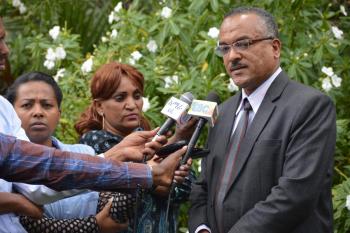The Ethiopian Ministry of Water, Irrigation and Electricity in conjunction with Water Integrity Network (WIN) organised the first ever Water Integrity Forum for East Africa, May 9-11. The event was in Addis Ababa.
Published on: 18/05/2017
The First ever Water Integrity Forum for East Africa ended on Thursday 11th May 2017, with the conclusion that integrity issues in the WASH sector are important, real, and require action from governments, civil society organisations (CSOs) and private sector actors.
The three day event (May 9-11), was hosted by the Ethiopian Ministry of Water, Irrigation and Electricity in conjunction with Water Integrity Network (WIN), with the theme: Water Integrity in East Africa: Linking policy with practice. The event attracted participants from various countries including Ethiopia, Kenya, Rwanda, Uganda, Zambia and co-convening International and national NGOs.

Participants discussed key issues around integrity in water, including, monitoring integrity, managing integrity, building partnerships with regional and international bodies, generating evidence, capacity enhancement, as well as Knowledge Management for water integrity. The key question was: What more needs to be done to ensure integrity?
At the end of the three days, some key conclusions and recommendations were made by a panel of speakers, among them the Ethiopian State Minister for Water, Irrigation and Electricity, Mr Kebede Gerba. He said, "You can't sustain growth without integrity, accountability and transparency." Citing the Ethiopian experience, Gerba noted that there is a lot of investment in water projects including water for irrigation, for production of hydropower and for home consumption. "The successful implementation and management of these investments call for high levels of integrity," he said.
You can't sustain growth without integrity, accountability and transparency
Responding to participants' views that governments lacked the political will to improve integrity, Minister Gerba said that political will does not come by chance. It comes by force sometimes. "Societies must demand for governments to deliver on their promises. Democratization and empowerment are crucial. Communities must ask government to act," he urged.
Dr. Canisius Kanangire, Executive Secretary of African Ministerial Council on Water (AMCOW) noted that indeed governments had expressed political will by establishing the necessary institutions for example: The Anti-corruption Commission in Kenya, the Inspectorate General of Government (IGG) and the Ministry of Ethics and Integrity in Uganda, and many others.
Governments have also demonstrated political will by organizing and participating in forums like this one. "But corruption cannot be eradicated with political will alone," Kanangire said. "Political will should be translated into something that can be measured and monitored. We need to look into ways where institutions working at different levels can discuss integrity issues in relation with their mandates at different levels."
Panelists also urged CSOs to play their oversight role, especially with regard to implementation of policies. "Government cannot set and also oversee the implementation of its own policies," said Doreen Wandera, Executive Director of Uganda Water and Sanitation NGO Network (UWASNET). She urged CSOs to track budgets at all levels and gather evidence of how WASH money is spent and whether there is value for money. Such evidence should then be presented at common forums and used to give feedback to government and other actors.
Wandera further urged CSOS to reach out and contribute to community capacity building in terms of water integrity and governance. "CSOs should bring information to community level and help the people understand things. Some projects are documented and presented in high tech language which the common people cannot identify with. This leaves the people unable to participate in the governance of such projects," she added.She observed that one of the key challenges of CSOs is that their own integrity is under question. This means that they have no authority and confidence to engage with and oversee other actors.
Panelists urged CSOs to avoid the tendency to bypass government rules and regulations, make efforts to partner with government and work in a coordinated and harmonized way. "CSOs should have a paradigm shift especially in advocacy. Let's not build extremes where the government is on the defensive all the time," said Dr Kiprorir Sigi, Water Minister from Bomet County in Kenya.
Other recommendations to improve water integrity were:
"If we solve the problems in the water sector we solve problems in other sectors" Kenya's Kipkorir Sigi concluded.